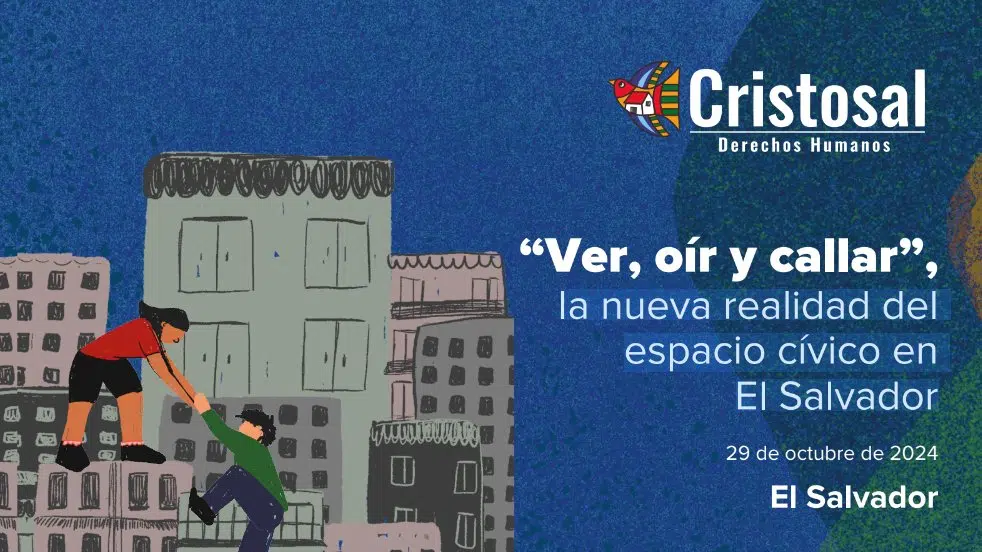A total of 128 civil society organizations participated in Cristosal’s report “See, Hear, and Stay Silent,” which investigated the new reality of civic space in El Salvador and concluded that many of these groups have suffered censorship and persecution. Additionally, public institutions have shut down spaces for them to carry out their activities.
Out of all the participating organizations, 85.9% admitted to resorting to self-censorship and limiting their freedom of expression for fear of government reprisals or those from individuals aligned with the administration.
“The respondents report resorting to self-censorship due to fear of being detained under the state of exception. Many are even afraid to participate in press conferences because it could lead to threats, not just from institutions but from the population that feels aligned with the government,” explained Víctor Márquez from the Movimiento Indígena para la Articulación de las Luchas de los Pueblos Ancestrales de El Salvador (MILPA) (Indigenous Movement for the Articulation of the Struggles of El Salvador’s Ancestral Peoples).
According to Cristosal, this censorship and self-censorship also affect other expressions, as people are now afraid to express their ideas on social media if they are contrary to the official line. There is also increasing fear of participating in marches and peaceful protests.
In the case of the Movimiento de Víctimas del Régimen (MOVIR) (Movement of Victims of the Regime), Sonia Vásquez stated that they suffer constant harassment and persecution by authorities, both physically and on social media.
“Influencers aligned with the government are the most common aggressors, followed by supporters of the administration, the Executive Branch, and the Legislative Branch. Specifically for MOVIR, there is obstruction of processes. This scenario has become unsustainable for some, and many have even considered migrating to avoid this harassment,” Vásquez explained in relation to the report’s data.
Ana Cecilia Hernández, of the Movimiento de Mujeres Salvadoreñas (MSM) (Salvadoran Women’s Movement), referred to the closure of spaces. She said that as an organization, they had been conducting sexual education workshops in schools and public institutes, but since the government rejected gender ideology, that has changed.
“One of the things we find outrageous is that even ISDEMU is now closed to us. They shut down the space of institutions we fought to create. Our space for dialogue is being closed,” she stated.
Rina Monti explained that the study allowed them to identify many other impacts occurring towards organizations, such as the fear of organizing, stigmatization of organized work, and restriction of information.
Organizaciones de sociedad civil en El Salvador se autocensuran por temor a represalias
Un total de 128 organizaciones de sociedad civil participaron en el informe “Ver, oír y callar” de Cristosal, en el cual se investigó la nueva realidad del espacio cívico en El Salvador y concluyó que muchos de estos colectivos han sufido censura y persecusión, pero además las instituciones públicas les han cerrado espacios para realizar sus actividades.
De todas de organizaciones participantes, un 85.9 % admitió que recurren a la autocensura y limitan su libertad de expresión por temor a represalias gubernamentales o de individuos afines al oficiliasmo.
“Los encuestados manifiestan haber recurrido a la autocensura y esto se debe al temor a que se les apliquen detenciones en el marco del régimen de excepción. Muchos incluso ya tienen temor de participa en conferencias de prensa, porque eso puede llegar a significar amenazas y no solo por las instituciones, sino po la población que se siente identificada con el gobierrno “, explicó Víctor Márquez, del Movimiento Indigéna para la Articulación de las Luchas de los Pueblos Ancestrales de El Salvador (MILPA).
Según Cristosal, esta censura y autocensura afecta también otras expresiones, pues la gente ya tiene temor de expresar sus ideas en redes sociales si son contrarias al oficialismo o cada vez hay más temor a participar en marchas y protestas pacíficas.
En el caso del Movimiento de Víctimas del Régimen (MOVIR), Sonia Vásquez dijo que ellos sufren constante acoso y persecusión de las autoridades, tanto físico como en redes sociales.
“Los influencers del oficialismo son los agresores más comunes, seguido por los seguidores del oficialismo, el Órgano Ejecutivo y el Legislativo. En el caso específico del MOVIR hay entorpecimiento de los procesos. Este escenario se ha vuelto insostenible para algunos y muchos han considerado incluso en migrar para evitar este acoso”, expuso Vásquez en relación a los datos del informe.
Ana Cecilia Hernández, del Movimiento de Mujeres Salvadoreñas (MSM), se refirió al cierre de espacios. Dijo que como organización daban talleres de educación sexual en centros escolares e institutos públicos, pero desde que el gobierno rechazó la ideología de género eso cambió.
“Una de las cosas que nos parece que es el colmo es que incluso ahorra se nos cierre hasta el ISDEMU. Nos cierran el espacio de instituciones que nosotros luchamos para crear. Se nos cierra el espacio para poder dialogar”, expuso.
Rina Monti explicó que el estudio les permitió identificar muchas otras afectaciones que ocurren hacia las organizaciones, como el miedo a organizarse, la estigmatización del trabajo organizado y la restricción de información.

